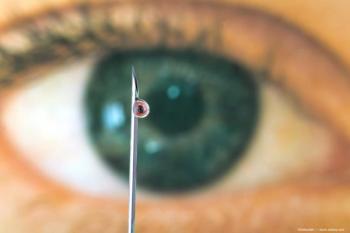
Novel dexamethasone punctum plug for ocular allergy shows promise
A novel dexamethasone-eluting punctum plug was safe and showed some evidence of efficacy for relieving signs and symptoms of allergic conjunctivitis in a phase II study.
TAKE HOME MESSAGE: A novel dexamethasone-eluting punctum plug was safe and showed some evidence of efficacy for relieving signs and symptoms of allergic conjunctivitis in a phase II study.
By Cheryl Guttman Krader; Reviewed by Francis Mah, MD
La Jolla, CA-A sustained-release dexamethasone punctum plug (OTX-DP, Ocular Therapeutix) for treatment of allergic conjunctivitis show that it is safe and may have efficacy for controlling itching and redness over the long term without daily drops, according to top-line results from a phase II study.
The product is placed in the canaliculus and continually releases an extremely low dose of dexamethasone to the ocular surface for about 4 weeks. The carrier plug resorbs and passes through the nasolacrimal system so that it does not need to be removed.
“Corticosteroids can have an important role as adjunctive therapy for treating patients with allergic conjunctivitis who are experiencing a severe flare, but there are potential safety concerns accompanying their use,” said Francis Mah, MD, who was medical monitor for the phase II study, and director, cornea and external disease, and co-director, refractive surgery, Scripps Clinic, La Jolla, CA.
“The low-dose, sustained-release dexamethasone punctum plug would offer improved convenience for patients with severe and/or chronic allergic conjunctivitis because it would eliminate the need for instillation of topical drops,” he said. “In this phase II study, there were no IOP-related safety issues or any other corticosteroid-related adverse events associated with its use.”
About the study
The prospective, multicenter, randomized, double-masked trial enrolled 68 patients and evaluated the efficacy of the investigational corticosteroid for preventing allergen-induced ocular itching and conjunctival redness using a modified Conjunctival Allergen Challenge (CAC). Participants had a positive history of ocular allergies and a positive skin test reaction to a perennial allergen.
They were randomly assigned to insertion of the sustained-release dexamethasone punctum plug or placebo and then assessed for their reactions to allergen exposure on days 14, 28, and 42 post-insertion. Severity of ocular itching and conjunctival redness was graded using a 5-point scale.
At all three follow-up visits, patients receiving the investigational dexamethasone product had significantly lower ocular itching and conjunctival redness scores than the control group. The mean difference in scores for both ocular itching and redness between the dexamethasone and control groups at day 14 was >0.5 units, and thus satisfied one of two FDA criteria for assessing the efficacy of anti-allergic eye drops in the CAC model.
The second FDA criterion requires that an investigational product achieve a mean difference of ≥1.0 unit compared with placebo. However, this magnitude of difference was not achieved for assessments of either ocular itching or conjunctival redness at the majority of time points.
“In considering the results, it is important to keep in mind that the endpoints for demonstrating efficacy in the CAC model were established for evaluating the efficacy of a topical medication,” Dr. Mah said. “In fact, looking at the data, there were statistically significant improvements in the dexamethasone plug group so it is very promising.”
Phase III trials
Ocular Therapeutix is planning to conduct phase III studies investigating the efficacy and safety of OTX-DP for treatment of allergic conjunctivitis. However, the protocol is still being designed.
Enrollment in phase III trials investigating OTX-DP for the treatment of inflammation and pain after cataract surgery was completed in October 2014.
Francis Mah, MD
Dr. Mah is an advisor for, receives lecture fees, and/or receives grant support from Alcon Laboratories, Allergan, Valeant/Bausch + Lomb, and Ocular Therapeutix.
Newsletter
Don’t miss out—get Ophthalmology Times updates on the latest clinical advancements and expert interviews, straight to your inbox.





























